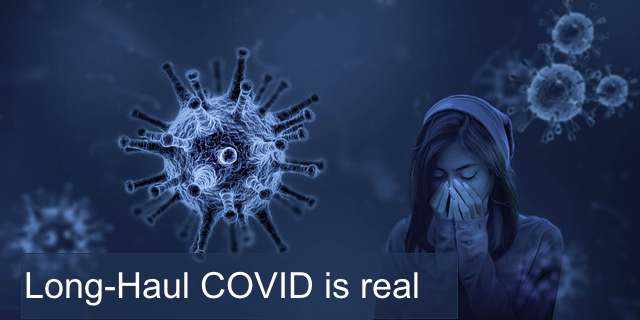Science is starting to validate what some COVID-19 survivors have experienced since their diagnosis: Long-haul COVID, also called long term COVID, is real. If you had COVID and still “don’t feel right,” you are not alone.
“I’ve been asking my doctors ‘When am I going to feel better?’ since I left the hospital,” said Doug Cleminshaw, a retired designer. “They say they don’t know.” Doug still experiences profound fatigue more than a year after having acute COVID, often sleeping over 12 hours a day. “I have things I want to do, and I’m just too tired.”
But what about the mild cases? People with mild symptoms were advised just to stay home and self-isolate. How do you measure the overall long-term impact of COVID on a general population?
A pre-print, published in February 2022, explored this question. The Statens Serum Institut, under the direction of the Danish Ministry of Health, conducted a national survey to reveal self-reported health data from over 152,000 people with and without COVID, with striking results: Six to twelve months after the COVID test date, one third (29.6%) of the 61,002 test-positive subjects experienced “at least one physical post-acute symptom.”
More than half (53.1%) of test-positives reported at least one of the following conditions: concentration difficulties (28.34%), memory issues (27.25%), sleep problems (17.27%), and mental or physical exhaustion (32.58% and 40.45%, respectively), compared to only 11.5% of the 91,878 member control group. Data were collected 6, 9, or 12 months after the test using web-based questionnaires.
Preliminary results from another study, published in Nature in March show “strong evidence for brain-related abnormalities” after COVID-19. The UK researchers compared the brain scans of 401 people who had been scanned once before their COVID diagnosis and once afterward, against 384 controls who were also scanned twice. Even after eliminating the 15 cases that had been hospitalized, they still found greater changes in markers of tissue damage in brain regions functionally connected to sense of smell, and greater reduction in global brain size. The infected participants “also showed on average larger cognitive decline between the two time points.” The authors noted that whether or not these changes can be reversed remains to be studied.
Long-haul COVID has been difficult to study because so many organ systems are involved. The Journal of Clinical Medicine published a special issue called, “Long-Term COVID-19: The Lasting Health Impacts of COVID-19,” including an article addressing the interactions of the lung, heart and brain in post-viral syndromes. While the authors cite a study saying only one in ten COVID survivors experience symptoms persevering over 12 weeks, they affirm that long COVID exists. They acknowledge that it has protracted symptoms across multiple organ systems, and includes mental health issues. They state that patients with post-COVID symptoms “require personalized treatment as well as ongoing support.”
That is, if you still feel the symptoms weeks and months after having had COVID-19, research is validating what you already knew – recovery may be a longer process than anyone anticipated. People experiencing vague and varied symptoms are to be believed, studied, and treated. Even if you weren’t hospitalized, you can have long-haul COVID.
Image by Willgard Krause from Pixabay






